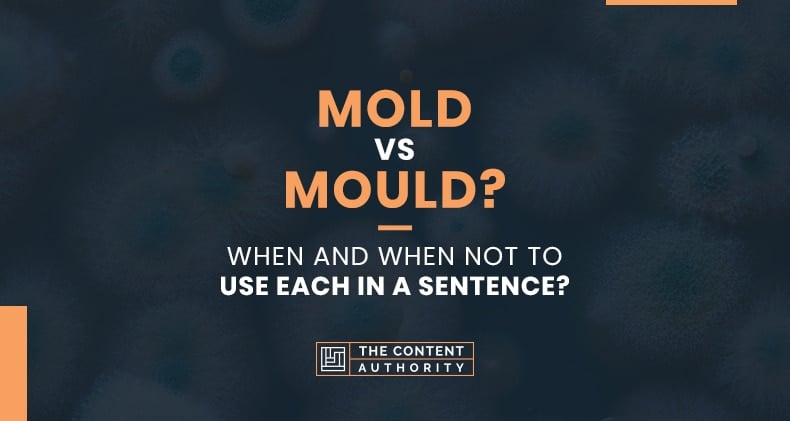The existence of variants of the English language means that different spellings convey the same meaning. This situation is most prominent when you compare American and British English. While there are general rules such as using a “z” in American English rather than an “s” as in British English, there are some exceptions to this rule. That is we might question when to and when not to use certain words like “mold” vs “mould,” and why.
“Mold”, from its American English spelling, is used as a verb and a noun in a sentence. It can mean the shape surrounding something and the fungus that grows on organic matter. “Mould,” although it conveys the same meaning, differs in that it is the British variant.
Still, both words convey multiple meanings, and you need to identify these meanings to know how to use them in a sentence. In this article, we will tell you all about the meaning and when to use each word in a sentence.

When to and When Not to Use “Mold” in a Sentence
Our first concern is when to and when not to use the word “mold” in a sentence. Of course, the first thing you need to keep in mind is that the word is only applicable when writing in American English. So, everything we will be discussing here relates only to the use of the word in American English.
Now that we have cleared that up let us get right to when and when to use the word “mold” in a sentence. As you would expect, understanding when to and when not to use the word in a sentence depends largely on understanding the meaning and nature of the word.
So, first, how does the word “mold” function in a sentence? Generally, the word can function as a verb and a noun in a sentence. Then, the meaning of the word will depend on the function it performs in a sentence. Let us examine this in detail.
Regarding the first form that the word takes, it can function as a noun within a sentence. As you can tell, this refers to a naming word that can stand in as either the object or subject in a sentence. In this instance, the word “mold” can convey various meanings.
As a noun, the word can refer to the fungus that emerges or grows at the top of organic matter. In turn, you can use this word when you want to convey that something is a fungus growing on organic matter.
Remember, to use this spelling you must be writing in American English. Here are some examples showing the use of the word in this sense in a sentence.
- The quiche I made a few days back appeared all fine yesterday, only for me to find mold all over it today
- We have had multiple cases of mold growing on wooden frames in the house; we assume that they must be damp
Beyond this, as a noun, the word “mold” can also convey another meaning. This involves reference to a container that provides shape to molten liquid while it solidifies. This use is usually related to pottery and sculpting. Here are some examples of how to use the word in a sentence to convey this meaning.
- I plan to get a more efficient mold next week, so I do not waste time when trying to create my artworks
- The secret behind the beauty in his artwork is that he uses a mold to bend his materials
Finally, as a noun, the word “mold” also conveys an additional meaning. This use is figurative. In turn, it depicts a recognizable form or convention. For instance, something that has been done over the years has now become engraved as a general practice among a group of people. No, here are some examples to also help you understand the use of the word in a sentence
- There is no doubt that Kelvin in our literary class is a mold of William Shakespeare; you just have to read his works
- He vowed that he would not succumb to the mold of greasing hands to get things done
Now that we have examined the use of the American English variant “mold” as a noun, we will dive into its usage as a verb. Like you already know, a verb is an action word that conveys doing something. In turn, the word “mold” in this sense means to form a thing and give it a new shape. For instance, when you get those snow and create a snowball from it.
Here are some examples of how you use the word “mold” as a verb in a sentence.
- I intend to spend three months training you, and I intend to mold you and my other apprentices into fine painters
- Do not relent because of failure, mold that anger and pain into what drives you
You have no doubt gained insight into the use of the word in a sentence. Now here is a summary of when to and when not to use the word in a sentence.
If you are writing in American English, you can use the word “mold.” You can also use it as a noun or a verb to convey any of the meanings identified above. On the other hand, you are not to use the word if you are writing in other variants of the English language such as British English or Australian English.
When to and When Not to Use “Mould” in a Sentence
Now that we have cleared up when to and when not to use the word “mold” in a sentence, we can move on to our next concern. That is when to and when not to use the word “in a sentence.
The first thing you must understand is whether there is a difference between both words, whether they mean the same thing even more, and whether you can use the words interchangeably.
Well, the word “mold” and “mould” both mean the same thing. The word “mould” functions both as a verb and as a noun in a sentence, just like its counterpart. Even more, it conveys all the same meaning that the word “mold” conveys in a sentence. For instance, as a verb, it also means to form something and give it another shape.
Also, as a noun, it refers to the fungus on organic matter, including a container used to shape molten liquid as the liquid takes a solid form. Then, it also conveys the meaning of a generally accepted and recognized form or convention.
However, the question remains, are the words interchangeable? Well, the words are not interchangeable. This is because the words apply to different variants of the English language. So, while the word “mold” applies to American English, the word “mould” applies to British English.
So, when to use the word “mould” is when you are writing in British English, and you want to convey any of the meaning above. On the other hand, you do not use the word when you are writing in American English, even if that is the meaning you want to convey.
Here are some examples of the word “mould” that cut across the various functions that the word performs in a sentence.
- We found the bread with mould thanks to the moist area where we stored it
- I find myself using just one mould for my metal works, although I have more than one
- He is a boy in the mould of a man
- Please mould a nice cake from the flour beside you
Understanding the Difference
So far, we have explained when to and when not to use both words in a sentence. Now, you have a grasp of how best to convey the meaning you want, depending on your choice of language. While this information is important, you also need to ensure that you can remember them when the need arises.
So, here is something that should help you remember.
First, you want to remember the general distinction between words across the variants of the English language. However, in case this is not sufficient, then put this trick into use.
The United Kingdom, where British English gets used, starts with the letter “u.” If you want to write in British English, use the word with “u” in it. That is, use the word “mould.” When you want to write in American English, apply the same trick, and use the word that does not come with the letter “u.”
Final Thoughts
Distinguishing between words across the variants of the English language appears all easy until we find ourselves in some confusing situation. It is quite easy to feel the same way with “mold” and “mould.” You might even wonder if they have different meanings.
However, the reality is that they pass the same meaning, only that you cannot use them interchangeably. This is what we have explained in this post. So, read up and enjoy being a pro writer.
Shawn Manaher is the founder and CEO of The Content Authority. He’s one part content manager, one part writing ninja organizer, and two parts leader of top content creators. You don’t even want to know what he calls pancakes.



